
UCLA Samueli Announces Class of 2023 Awardees and Commencement Student Presenters
Every year, the UCLA Samueli School of Engineering honors new graduates who have made special contributions and have distinguished accomplishments. Following is an overview of the 2023 schoolwide award recipients and presenters, including a brief interview with each. Responses were edited for brevity and clarity.
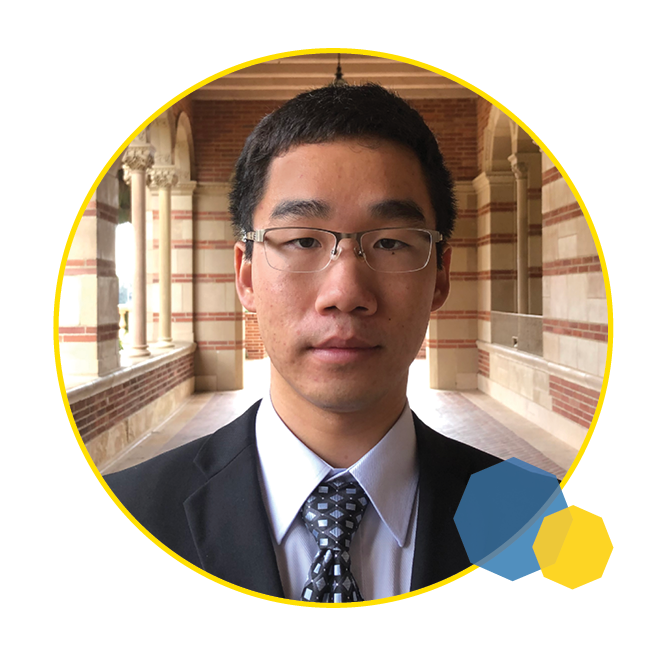
SCHOOLWIDE OUTSTANDING BACHELOR OF SCIENCE
Kyle Jantan Chen
Kyle Jantan Chen graduated in June with a bachelor’s degree in bioengineering. His research interests focused on patient-oriented and accessible medical-device development. Since his freshman year, Chen had been an undergraduate researcher. He spent more than a year with the Wearable Bioelectronics Research Group, investigating the sensing and energy-harvesting capabilities of triboelectric nanogenerators. Since 2021, he had also been an undergraduate researcher with the Kamei Laboratory, where he focused on optimizing the efficiency and sensitivity of devices that monitor the heart medication Digoxin. Outside of the lab, Chen was a Build Team project manager with the Biomedical Engineering Society at UCLA, leading 30 students on a project to develop individualized pulse oximeters. Chen plans to pursue a master’s in bioengineering at UCLA while preparing to apply for medical school.
Q&A
What was your favorite part of being an undergraduate researcher at the Kamei Laboratory?
Undeniably, my favorite part — and also the most unique part — of being in the Kamei Laboratory is the lab culture and all of the amazing people I’ve met over the years. Everyone is like-minded in their passion for research and their belief in the overall mission of the lab, fostering a collaborative environment that makes being in the lab fulfilling and rewarding. Beyond the research, everyone is incredibly supportive of each other, creating a close-knit community that is like a family. The Kamei Laboratory has been a constant for me for the majority of my undergraduate years, and being able to walk into the lab every day and work alongside everyone is truly a privilege that I cherish greatly.
What are your goals for the future, specifically with your interest for medical-device development?
My current plan is to get a master’s in bioengineering here at UCLA while applying to medical school, but beyond that, I’m not too sure! What I am sure of though is my wish to continue improving accessibility to medicine, whether it be through device development as a bioengineer or through patient advocacy as a physician.
A longstanding goal of mine has been to improve point-of-care stroke detection — a goal that stems from my experience with my father’s stroke when I was younger and ultimately motivated my decision to study bioengineering. The uncertainty and difficulty that come with stroke detection drove me to be involved in research that could address those shortcomings. Regardless of where my career takes me in the future, I hope to contribute to medical device development that could help me realize that goal.
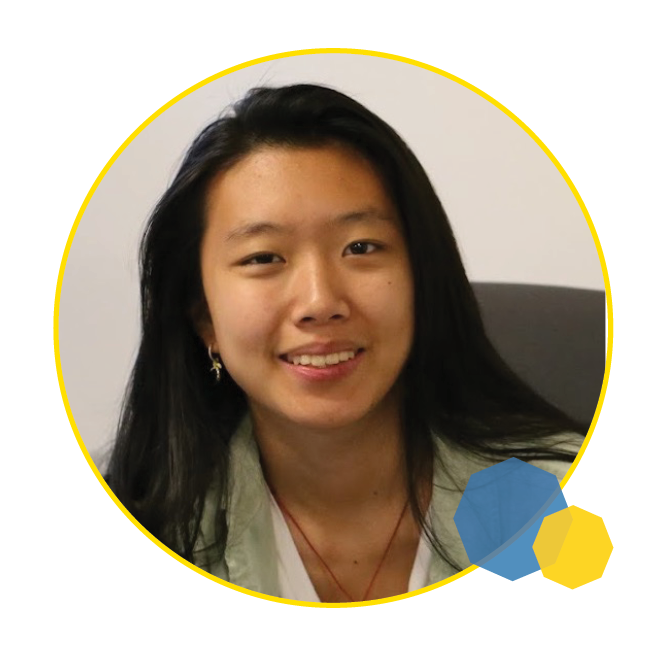
HARRY M. SHOWMAN PRIZE
Sophia Chengping Shen
Sophia Chengping Shen graduated in June with a bachelor’s degree in electrical engineering and a minor in systems biology. In April, she was named as one of eight UCLA Samueli students to receive the National Science Foundation Graduate Research Fellowship, a five-year fellowship that supports students from underrepresented groups to participate in research opportunities. As a member of bioengineering assistant professor Jun Chen’s Wearable Bioelectronics Research Group and dentistry professor Igor Spigelman’s neuropharmacology lab, Shen has played a role in 19 published research papers — as first author on four of them. In addition to her studies and research, she also served as the 2022-23 webmaster for Tau Beta Pi at UCLA, a nationally recognized engineering honor society. A recipient of the 2023 Graduate Research Fellowship from the National Science Foundation, Shen will be pursuing a doctorate in bioengineering at Stanford University this fall.
Q&A
How did you get interested in research? What has been your proudest accomplishment as an undergraduate researcher at UCLA?
I was always a curious child who liked to create. As I got older, I became more curious about the world around me, especially biology — how does the body work and why does it work like that? My first research experience was in high school, where I volunteered at a pharmacology lab examining the mechanisms of addiction in mice. This experience really solidified my interest in research and pursuing a career that combines biology with technology. I thus joined both Dr. Jun Chen’s and Dr. Igor Spigelman’s labs in my freshman year to gain research experience in bioengineering and biology, respectively.
After four years, I believe my proudest accomplishment is developing a cheap, wearable and self-powered cardiovascular sensor that can provide continuous monitoring for patients. Through this project I was able to create a solution to a problem that improves the well-being of people. Projects such as this are why I am interested in the field of biomedical devices because they could make a positive impact on the world by providing immediate medical care to all without the high costs.
Where do you see the field of biomedical devices progressing and what types of devices would you want to help develop in the future?
Biomedical devices have only recently begun incorporating electronic components. This has unlocked a new world of possibilities, making biomedical devices a rapidly expanding field requiring an interdisciplinary team including chemists, biologists, material scientists, electrical engineers, etc. I imagine that in the future, biomedical devices will effectively use both chemistry and technology to interface with biology for personalized health care. Such devices could harness both machine learning and the Internet of Things (IoT) to monitor, detect and treat common diseases and disorders using expert opinions to provide immediate and personalized health care, all without needing the amounts of time and cost for current medical care. Furthermore, biomedical devices could also be used by researchers as a tool to understand human health through aspects that were not possible in the past. For example, the invention of X-ray machines allowed medical researchers to study the internal workings of human physiology even when a subject is alive. In the future, I hope I can help develop biomedical devices to aid in our understanding and the treatment of nervous system disorders and diseases, many of which, fatal or severely reducing quality of life, still remain poorly understood.
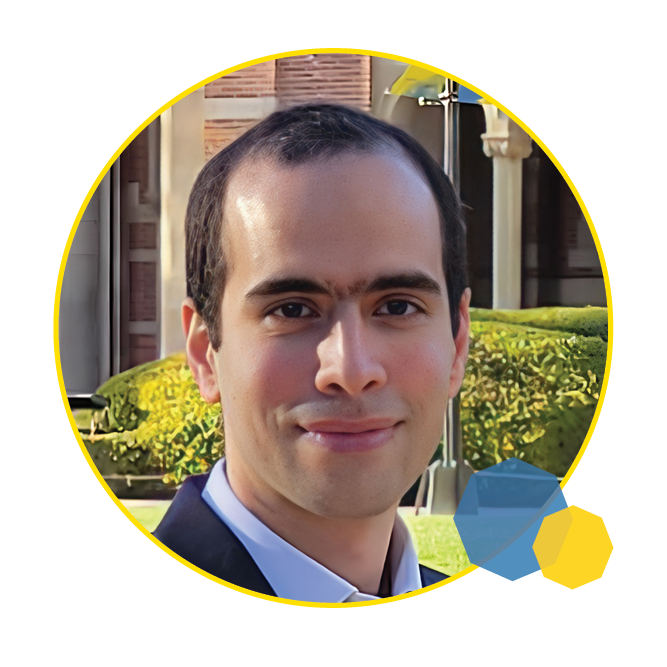
HARRY M. SHOWMAN PRIZE
Hossein Montazerian
Hossein Montazerian received his doctorate in March in bioengineering and is now a postdoctoral associate at the MIT Koch Institute for Integrative Cancer Research. While at UCLA, he was a graduate student researcher at the California NanoSystems Institute and worked with the Terasaki Institute for Biomedical Innovation. Prior to getting his Ph.D. in five years at UCLA, Montazerian received a master’s degree in mechanical engineering in 2018 from the University of British Columbia in Canada and a bachelor’s degree in the same field from the Shahid Rajaee Teacher Training University in Iran in 2015. Montazerian’s main research focuses on the design of biomaterials and devices for therapeutic applications.
Q&A
How did you get into research and specifically bioadhesives for wound closure?
I embarked on my research journey at the early stages of my academic path through an undergraduate research program focused on tissue engineering. Being a mechanical engineer, I have always sought opportunities to apply my knowledge to address challenges in unconventional fields. Upon joining UCLA bioengineering, I had the privilege of interacting with clinicians from both science and engineering backgrounds, which allowed me to gain insights into the issues associated with suturing and stapling wound closure techniques through interviewing surgeons at UCLA. During this process, I became particularly intrigued by how mussels adhere to rocks underwater. This natural phenomenon inspired me to explore how we, as researchers, could harness these principles to manage bleeding wounds in a more efficient manner, without the need for sutures.
After graduation from UCLA, you went on to be a postdoctoral associate at the MIT Koch Institute for Integrative Cancer research. Why did you decide on pursuing academia and why did you decide on MIT’s cancer research facility?
During my time as a graduate student at UCLA, I acquired a diverse range of skills that well positioned me to engage in interdisciplinary research in the fields of drug delivery and bioelectronic-enabled cell therapy. In my current position, I am expanding collaborations with my network and colleagues at UCLA to develop next-generation bioadhesive implantable devices for the treatment of diverse diseases such as cancer and Type 1 diabetes. At MIT, I am immensely enthusiastic about the opportunities that lie ahead and eagerly look forward to translating the technologies developed in the past years closer to the clinic.
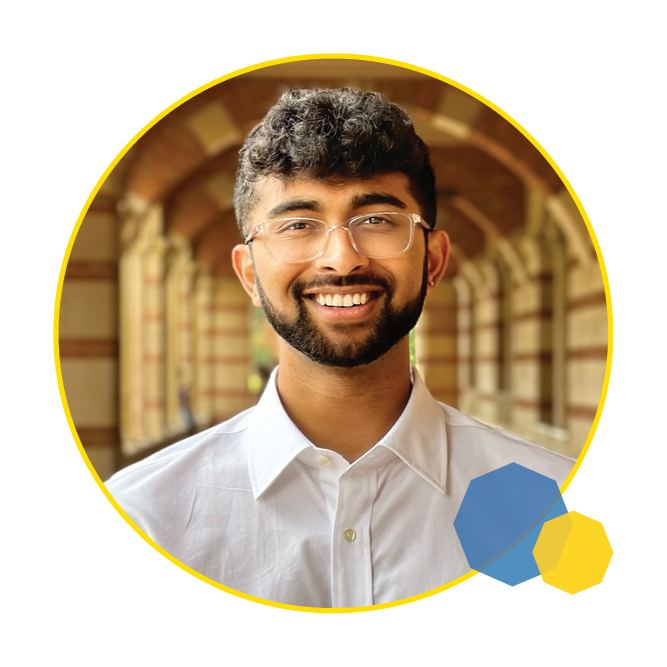
RUSSELL R. O’NEILL DISTINGUISHED SERVICE AWARD
Shreesh Jayateerth Karjagi
Shreesh Jayateerth Karjagi graduated in June with a bachelor’s degree in bioengineering and a technical breadth in civil and environmental engineering. He was a member of assistant professor Jun Chen’s Wearable Bioelectronics Research Group, where he studied 3D printing of magnetoelastic self-powered sensors and their use in electrical stimulation therapeutics. In the summer of 2022, Karjagi volunteered in Bali, Indonesia, where he collaborated with local farmers to develop a low-tech water filtration device to improve access to clean water for irrigation. Karjagi contributed to the academic community as a teaching assistant and as a project consultant for the UCLA Sustainable LA Grand Challenge. He interned at Fluid Synchrony, working in the domain of implantable micro-infusion pumps. After UCLA, he will join the Human Motor Control and Neuromodulation Lab at the Stanford School of Medicine as a research assistant.
Q&A
From your focus on biomedical devices to your interest in bioremediation in water and wastewater treatment systems, much of your research seems to focus on using your skills to be of service to others. Where does this passion stem from?
I feel a strong sense of duty to use my knowledge and skills to make an impact in society, and I believe this passion stems from a variety of factors, primarily my cultural identity and upbringing. As an international student from Nairobi, Kenya, coming from an Indian family with multiple worldviews, I was raised with a strong emphasis on service and giving back to the community. My parents instilled in me the idea of using my privilege of knowledge to benefit others as an expression of gratitude, and this has deeply influenced my perspective on the purpose of my work. Additionally, I am motivated by a selfish desire to chase the rewarding “feel-good” sensation that comes from witnessing positive change resulting from my work.
What is your next step after graduation and why did you pick that path?
After graduation, my immediate plan is to join the Human Motor Control and Neuromodulation Lab at the Stanford School of Medicine as a research assistant. The lab’s focus on reverse engineering brain circuitry and utilizing innovations in neural interfaces aligns perfectly with my passion for exploring and developing new solutions in the field of neuroengineering. I am eager to work alongside a diverse team of neuroscientists, engineers and researchers to translate brain activity into algorithms that can drive deep brain stimulation for Parkinson’s disease, ultimately aiming to restore movement and improve the quality of life for affected individuals. My long-term goal is to pursue a Ph.D. in the same field a few years down the line, while also aiming to develop confidence as an independent researcher.
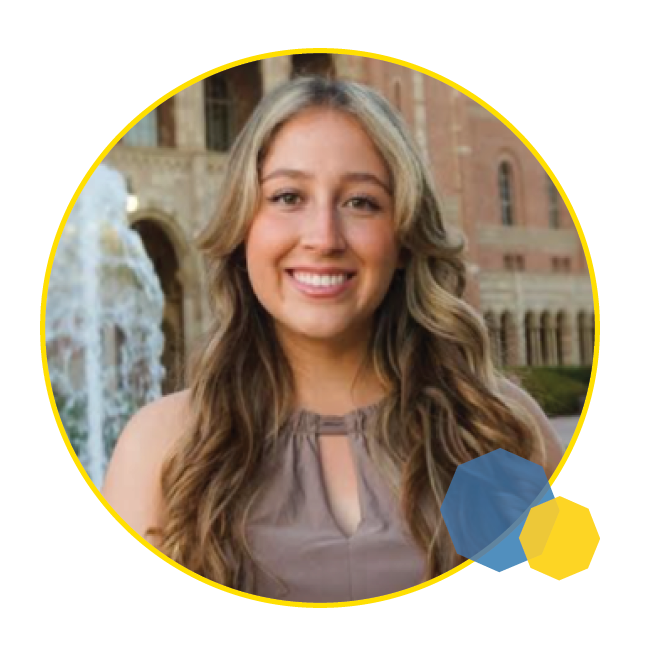
Undergraduate Student Speaker
Kelly Espino
Kelly Espino, a proud daughter of immigrant parents from Mexico and the eldest of three, received a bachelor’s degree in civil and environmental engineering in June. While an undergraduate, she was an outreach director of the UCLA Center for Excellence in Engineering and Diversity (CEED) and served as a two-term president of the Society of Latinx Engineers and Scientists (SOLES) at UCLA. Espino has been awarded dean’s honors, numerous scholarships and held several internships. She aims to help diverse and Latinx communities through national leadership roles with the Society of Hispanic Professional Engineers (SHPE). She aspires to become a certified engineer and design structurally safe buildings. Espino will return to UCLA for a master’s in structural engineering this fall through the Graduate Opportunity Fellowship.
Q&A
What message do you want to leave with your fellow Class of 2023 graduates?
No matter what path engineering takes you, I encourage each of you to always prioritize passion to drive your successes and love toward your experience with others. UCLA has taught us how to master the art of engineering that will fuel your career, but it also taught us how to embrace our communities, learn from one another and be an accepting Bruin family. Let’s build this family beyond the UCLA campus, and work toward a more loving, diverse and inclusive home for all! I would like to thank every one of you for being part of my story, whether your section was large or small, it was meaningful to the ending of the undergraduate chapter, and I cannot wait for the next one. Hasta luego!
You’ll be returning to UCLA for a master’s degree, what are your long-term goals and how did your undergraduate experience play a role in that?
My long-term goals are to become a certified structural engineer, and later a manager for an engineering firm. While completing this dream, I hope to remain heavily involved with SHPE and make a difference in a large-scale manner. My undergraduate experience helped me develop these goals through the love of structural engineering in my engineering and business courses, and passion for leadership with SOLES|SHPE at UCLA. I will be returning to UCLA for my master’s degree to continue my next step toward these goals! Hopefully within the next five years, I will be established in my place of work as well as SHPE, and have a professional engineer license under my belt. Most importantly, one of my largest long-term goals is to raise a family, as I learned my passion for family both at home and at school. I owe so much of my growth and development to my UCLA undergraduate career, CEED at UCLA and SOLES — but nothing more than my hard working parents and the loving familia at home who have always supported me.
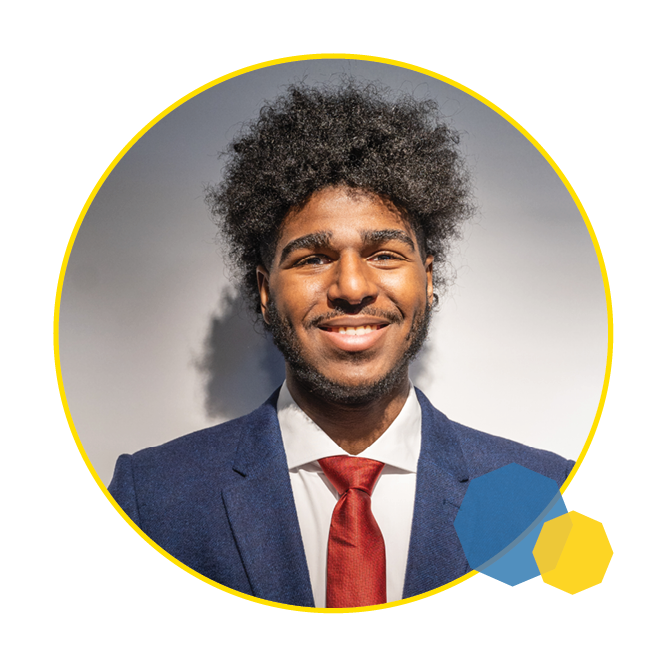
Graduate Student Speaker
Myles James Johnson
Myles James Johnson received an M.S. in March in electrical and computer engineering, with a focus on embedded systems and circuits. He also has a B.S. in the same field from Rutgers University. Besides engineering, Johnson has a passion for basketball and played for both UCLA and Rutgers men’s intercollegiate teams. As UCLA men’s basketball center, Johnson was nominated to the Pac-12 All-Defensive Team and received the NABC Honors Court award. He is committed to promoting diversity in science, technology, engineering and mathematics through the non-profit organization BLKdev he founded in 2020. Since his graduation from UCLA, Johnson has been a systems firmware developer at IBM, following an internship at the company that started May last year.
Q&A
You have balanced a lot during your time here, from playing NCAA basketball to interning at IBM. What were your favorite moments in each?
Playing NCAA basketball at UCLA was an amazing experience that taught me a lot about teamwork, leadership and resilience. Some of my favorite moments were when we beat Villanova at home in front of a roaring crowd, and the thrill of reaching the Sweet 16 and competing against some of the best teams in the country. I’m grateful for the opportunity to be part of such a talented and passionate team that represented UCLA with pride and excellence. While interning at IBM, I had the chance to work on exciting projects that involved z/Architecture mainframe computers. These projects were not only challenging and rewarding, but also had real-world applications that could benefit society. I learned a lot from my mentors and colleagues at IBM, who were always supportive, helpful and inspiring. They helped me develop my engineering and technology skills and gave me valuable insights into the industry.
How have your graduate studies helped your current role at IBM, and what are your long-term goals for your career?
My graduate studies at UCLA have been instrumental in preparing me for my current role at IBM. They exposed me to different viewpoints and approaches from my professors and classmates, who challenged me to think creatively and critically. Moreover, they enhanced my skills in problem-solving, communication and collaboration, which are essential for working in a dynamic and diverse environment. My longer-term goals for my career are to keep learning and growing as an engineer and a leader. I want to use my skills and knowledge to create innovative solutions that can make a positive difference in the world. I also want to inspire and mentor the next generation of engineers who will shape the future of technology.
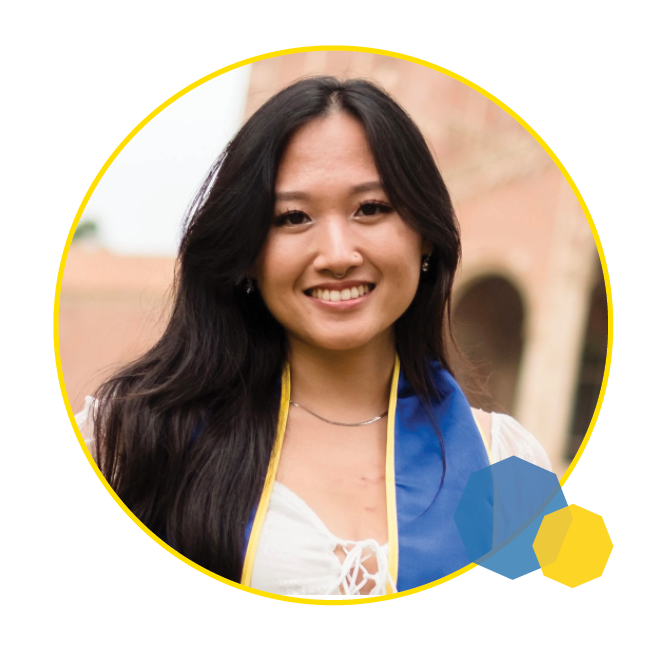
Undergraduate National Anthem Performer
Julia Zhong
Julia Zhong received a bachelor’s degree in bioengineering with a minor in data science engineering in June. In recognition of her academic achievements, she was elected as a member of the California Epsilon chapter of the Tau Beta Pi Engineering Honor Society. Zhong played an active role in the Biomedical Engineering Society (BMES), serving as the mentorship chair and technical project manager, fostering collaboration and guiding fellow students toward success. As a member of professor Gerard Wong’s lab, Zhong was actively engaged in cutting-edge microbiology research. She was also a proud member of Cadenza A Cappella, an all-female and nonbinary undergraduate student group at UCLA, where she shared her love for music and performing with friends. Zhong’s future plans include an internship in informatics at a pharmaceutical startup and a master’s degree in computer science or bioinformatics.
Q&A
How did you manage your commitments with undergraduate research, and BMES, along with your a cappella group, and how did music play a role in your time at UCLA?
It definitely wasn’t easy! As I became more involved in my commitments over the years, I found that I needed to be quite organized to keep up. This meant having an updated Google Calendar, planning out entire weeks on Sunday nights and studying using the Pomodoro method to stay energized and focused. There were many moments where it felt impossible to balance it all, but there was never a time that things didn’t eventually work out. At the end of the day, I simply made time for what was important to me.
As for music, this is actually my first year in my a cappella group, Cadenza! I had always wanted to participate in collegiate a cappella, and after three years of feeling “too busy,” I decided that it was now or never. Being a part of Cadenza this year felt so natural that I can’t even remember what it was like not having a group of friends to make music with. I am so grateful for that!
Will your data science minor and bioengineering degree play a role in your plans after graduation and if so, in what way?
I am hoping to eventually find a career in biomedical data science. I have always been interested in the fabrication of biomedical devices, and throughout my years at UCLA I developed another interest in computer science. I would like to work in the intersection of these two fields, using technology such as machine learning and artificial intelligence to solve biomedical problems. This summer, I will be working at a pharmaceutical start-up as a data science intern. Afterward, I’m hoping to pursue a master’s degree in computer science or bioinformatics.
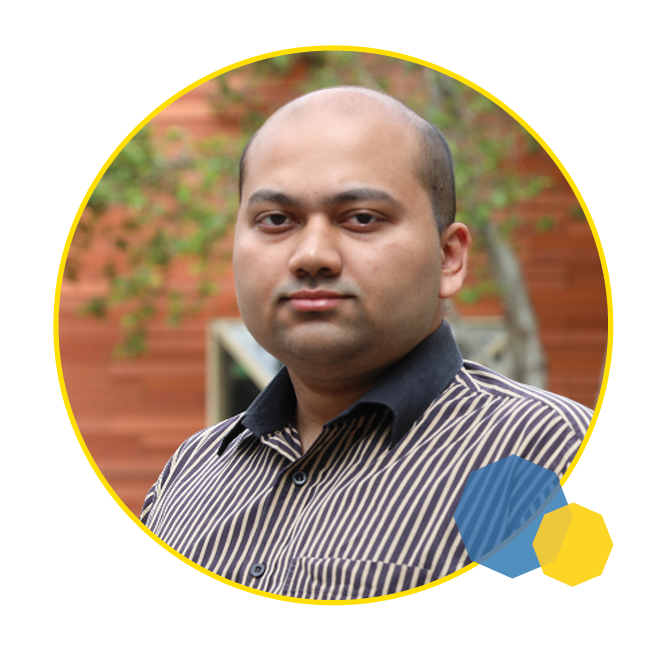
Graduate National Anthem Performer
Swapnil Sayan Saha
Swapnil Sayan Saha received his Ph.D. in electrical and computer engineering in June. He also holds a master’s from UCLA and a bachelor’s from the University of Dhaka, Bangladesh. Advised by professor Mani Srivastava, Saha’s research explores physics-aware tiny machine learning. He has authored more than 25 peer-reviewed articles and won more than 30 technical awards. At UCLA, he was an officer with the Graduate Students Association, the Engineering Graduate Students Association and the Electrical and Computer Engineering Graduate and Postdoctoral Society. He will soon join STMicroelectronics N.V. as an algorithm development engineer. Saha has been playing the guitar for more than 15 years and his progressive pop rock band Blndr debuted its album in June.
Q&A
How did you juggle your interests in music as a Ph.D. student? And what are you most excited about getting to perform the anthem at commencement?
I am a computer engineer by trade but a musician by heart and soul. I took the opportunity as a board member of three graduate student associations to incorporate live musical performances and concerts into on-campus events. These events not only gave me solace, empowerment and pause from the Ph.D. chaos, but also ushered me to meet my bandmates, write songs and work on the band’s first album. Perhaps the most enthralling part about being a commencement national anthem performer is your two minutes in the limelight in front of a crowd of a thousand. It is your two minutes of living a universal dream, approaching the asymptote of reality, and captivating the minds through the aural art from your musical paintbrush.
What has been your favorite part of your experience as a Bruin and how has that played a role in what you’ll be doing next?
While earning my Ph.D. made me technically sound, my experience with the departmental, schoolwide and campuswide graduate student associations transmuted me from an introvert to a socialite. Handling the organizational obligations improved a significant chunk of my communication, decision-making, conflict resolution, interpersonal and time-management skills. Combined with the acquired research rigor, the procured life skills helped me grab an internship position at STMicroelectronics and eventually a full-time role as an algorithm development engineer at the same company. The associations were like a family to me.
Amy Ionescu, Dannela Lagrimas and Riley de Jong contributed to this story.
